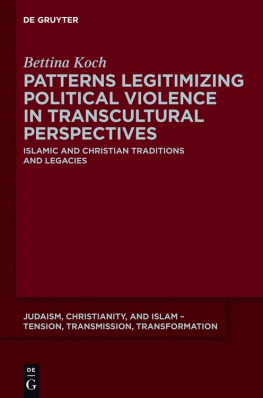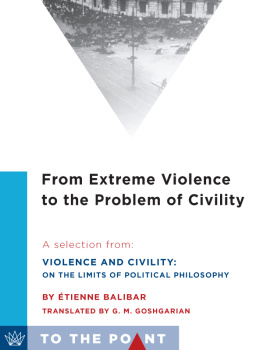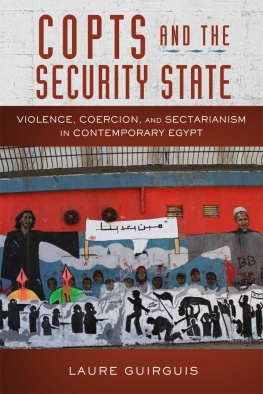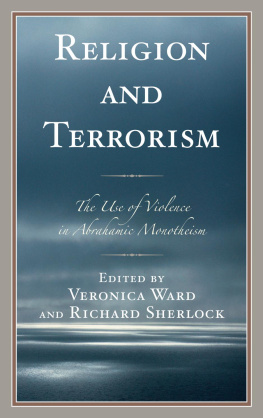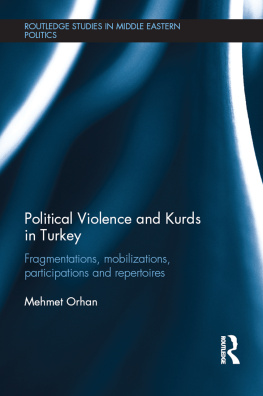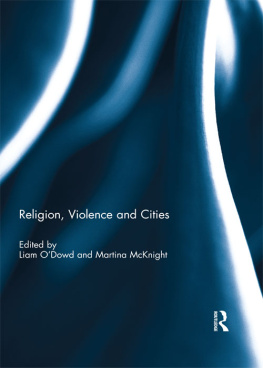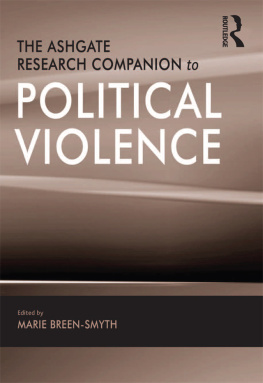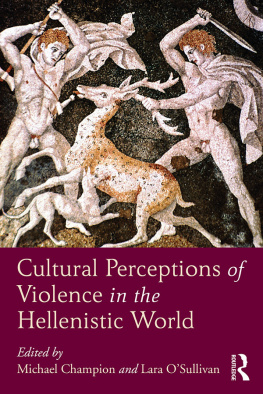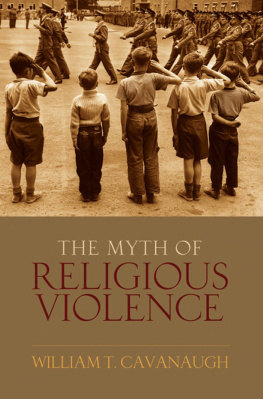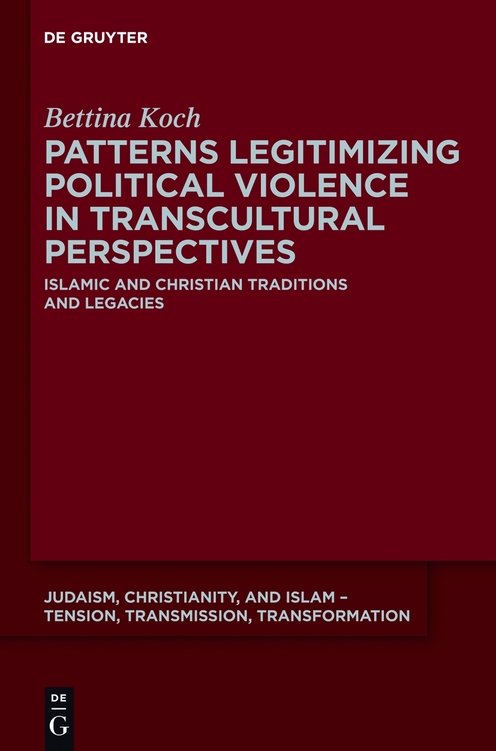The basic idea for this book project emerged during a conversation with Hartmut Behr in 2009. Two problems we discussed helped to formulate the main ideas for this book: First, the growing disconnection between discourses in political theory, particularly in the history of ideas tradition, and other subdisciplines in Political Science and, second, the dominantly one-sided academic and public discourses on violence that focus primarily on what is usually called Islamic terrorism.
Yet, moving from the initial idea to the book project did not happen in an afternoon. To make the project as sound as possible, I had to venture out to intellectual territories that were not necessarily at the heart of my previous research agenda. I could not have done it without the help of some of my colleagues. Ilja Luciak and Tony Spanakos shared some of their Latin American expertise with me, the novice, and commented on parts of my manuscript. I am similarly grateful, in alphabetical order, to Priya Dixit, Bob Goodin, Tom Izbicki, Tim Luke, Eva Nag, Cary Nederman, Ines Peper, Yannis Stivachtis, and Edward Weisband for their comments and continuous support. Dennis Moran read the entire manuscript. From the projects early stages on to its completion, particularly at times when the project was growing over my head, he remained a constant fountain of constructive thoughts and criticism. In addition, I would like to thank David Held, Pietro Maffettone, and Eva Nag warmly for their hospitality and inspirational conversations at Durham Universityincluding the trips to the beach.
David Orden deserves special recognition for the generous financial support I have received through the Global Issues Initiative (GII) of the Institute for Society, Culture and Environment at Virginia Polytechnic Institute and State University. The GII funding freed me from some of my teaching obligations and provided some additional resources for research travel. I wish to thank Georges Tamer for his trust in the project and for his invitation to the book series; Alissa Jones Nelson made the publishing process as smooth as an author could wish. I am tremendously grateful to the anonymous reviewers responses. Their comments and suggestions made it a far better book than the original manuscript. This book is dedicated to Peter Johanek, from whom I have learned the appreciation of the Middle Ages.
Bibliography
Abalos, David. The Medellin Conference. Cross Currents 19 (1969): 113132.
Abd al-Salm Faraj, Muhammad. The Forgotten Duty. In Michael Youssef. Revolt Against Modernity: Muslim Zealots and the West, 146177. Leiden: Brill, 1985.
Abdin, A. Z. al-. The Political Thought of asan al-Bann. Islamic Studies 28, no. 3 (1989): 219 234.
Abdullah, M. Amin. Introductory Elaboration on the Roots of Religious Violence: The Complexity of Islamic Radicalism. In Innerer Friede und die berwindung der Gewalt: Religise Traditionen auf dem Prfstand. V. Internationales Rudolf-Otto Symposion, Marburg, edited by Hans-Martin Barth and Christoph Elsas, 150158. Hamburg: EB-Verlag, 2007.
Abgral, Jean-Marie. Soul Snatchers: The Mechanics of Cults. New York: Algora, 1996.
Abrahamian, Ervand. Khomeini: Fundamentalist or Populist? New Left Review 186 (1991): 102119.
Abrahamian, Ervand. The Guerrilla Movement in Iran, 196377. In Iran, a Revolution in Turmoil, edited by Afshar Haleh, 149174. Albany: State University of New York Press, 1985.
Abrahamian, Ervand. A History of Modern Iran. Cambridge: Cambridge University Press, 2008.
Abrahamian, Ervand. Iran Between Two Revolutions. Princeton: Princeton University Press, 1982.
Abou El Fadl, Khaled. Rebellion and Violence in Islamic Law. Cambridge: Cambridge University Press, 2001.
Afghn, Sayyid Jaml ad-Dn al-. Answer of Jaml ad-Dn to Renan. In Nikki Keddie, An Islamic Response to Imperialism: Political and Religious Writings of Sayyid Jaml ad-Dn al-Afghn, 181189, 2nd ed. Berkeley: University of California Press, 1983.
Afghn, Sayyid Jaml ad-Dn al-. Despotic Government. In L. M. Kenny, Al-Afghn on Types of Despotic Government. Journal of the American Oriental Society 86, no. 1 (1966): 1927.
Afghn, Sayyid Jaml ad-Dn al-. Lecture on Teaching and Learning. In Nikki Keddie, An Islamic Response to Imperialism: Political and Religious Writings of Sayyid Jaml ad-Dn al-Afghn, 101108, 2nd ed. Berkeley: University of California Press, 1983.
Afghn, Sayyid Jaml ad-Dn al-. Rfutation des Matrialistes, treduction sur la 3e dition Arabe avec introduction et notes par A.-M. Goichon. Paris: Paul Geuthner, 1942.
Afghn, Sayyid Jaml ad-Dn al-. The Reign of Terror in Persia. The Contemporary Review 61 (1892): 238248.
Afghn, Sayyid Jaml ad-Dn al-. The Truth about the Neicheiri Sect and an Explanation of the Neicherie [Refutation of the Materialists]. In Nikki Keddie. An Islamic Response to Imperialism: Political and Religious Writings of Sayyid Jaml ad-Dn al-Afghn, 130180, 2nd ed. Berkeley: University of California Press, 1983.
Aguilar, Mario I. Cardinal Ral Silva Henrquez, the Catholic Church, and the Pinochet Regime, 19731980: Public Responses to a National Security State. The Catholic Historical Review 89, no. 4 (2003): 712731.
Ahmed, Akbar. The Thistle and the Drone: How Americas War on Terror Became a Global War on Tribal Islam. Washington, D.C.: Brookings Institution Press, 2013.
Ahmed, Safdar. Reform and Modernity in Islam: The Philosophical, Cultural and Political Discourses among Muslim Reformers. London: I. B. Tauris, 2013.
Akbarzadeh, Shahram and Abdullah Saeed. Islam and Politics. In Islam and Political Legitimacy, edited by Shahram Akbarzadeh and Abdullah Saeed, 113. London: Routledge Curzon, 2003.
Alatas, Syed Farid. Rejecting Islamism and the Need for Concepts Within the Islamic Tradition. In Islamism: Contested Perspectives on Political Islam, edited by Richard C. Martin and Abbas Barzegar, 8792. Stanford: Stanford University Press, 2010.
Amitai-Preiss, Reuven. Ghazan, Islam and Mongol Tradition: A View from the Mamlk Sultanate. Bulletin of the School of Oriental and African Studies 59 (1996): 110.
Angenendt, Arnold. Die Kreuzzge: Aufruf zum gerechten oder zum heiligen Krieg? In Krieg und Christentum: Religise Gewalttheorien in der Kriegserfahrung des Westens, edited by Andreas Holzem, 341367. Paderborn: Schningh, 2009.
Angenendt, Arnold. Toleranz und Gewalt: Das Christentum zwischen Bibel und Schwert. Mnster: Aschendorff, 2009.
Ansari, Ali M. Ltat, cest moi: The Paradox of Sultanism and the Question of Regime Change in Modern Iran. International Affairs 89, no. 2 (2013): 283298.
Armour, Rollin. Islam, Christianity, and the West: A Troubled History. Maryknoll: Orbis, 2002.
Ashouri, Daryoush. Creeping Secularism. Comparative Studies of South Asia, Africa and the Middle East 31, no. 1 (2011): 4652.
Assmann, Jan. Moses the Egyptian: The Memory of Egypt in Western Monotheism. Cambridge: Harvard University Press, 1997.
Assmann, Jan. The Price of Monotheism. Stanford: Stanford University Press, 2010.
Avalos, Hector. Fighting Words: The Origins of Religious Violence. Amherst: Prometheus Books, 2005.
Averroes [Ibn Rushd]. The Chapter on Jihad from Averroess Legal Handbook Al-Bidyah. In Jihad in Medieval and Modern Islam: The Chapters on Jihad from Averroes Legal Handbook Bidayat al-Mudjtahid and The Treatise Koran and Fighting by the Late Shaykh al-Azar, Mahmud Shaltut, edited by Rudolph Peters, 925. Leiden: Brill, 1977.
Ayoub, Mahmoud and Gary Legenhausen. Introduction. In Jihad and Shahadat: Struggle and Martyrdom in Islam, ed. Mehdi Abedi and Gary Legenhausen, 146. North Haledon: Islamic Publications International, 1986.

